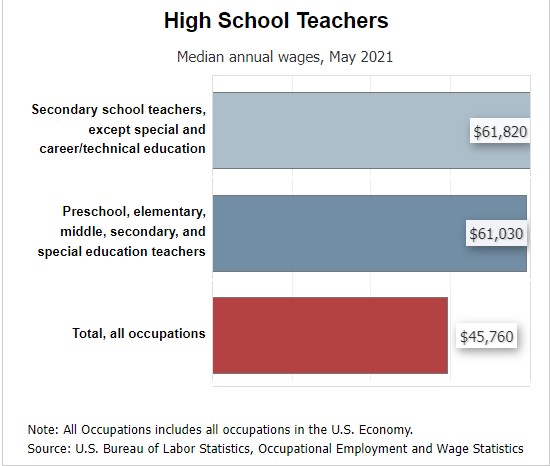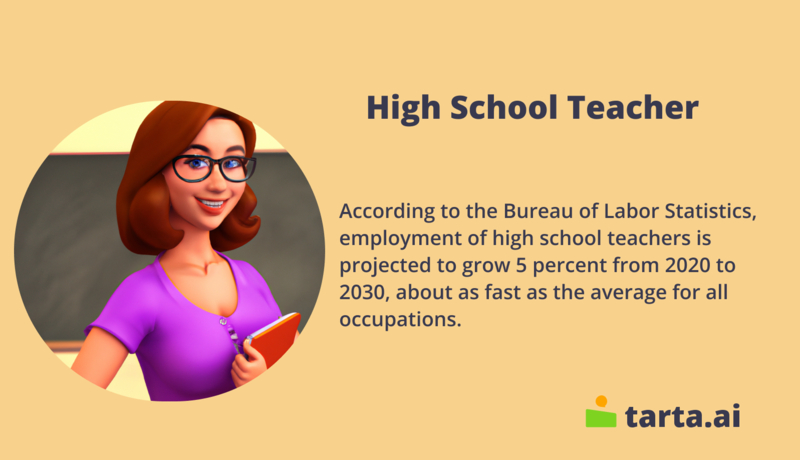High School Teacher: A Guide Into The Nuances Of The Job

A high school teacher is a professional educator who teaches academic subjects to students in grades 9-12. High school teachers typically specialize in one or more subjects, such as math, science, English, history, or foreign languages, and they are responsible for designing and delivering lesson plans, assessing student performance, and providing feedback and support to help students achieve their learning goals. High school teachers may also be involved in extracurricular activities, such as coaching sports teams or advising student clubs. To become a high school teacher, one typically needs to have a bachelor's degree in education or a related subject, as well as a teaching certification or license.
Requirements
The specific requirements to become a high school teacher can vary depending on the location and the school district, but generally, the following qualifications are necessary:
- Education: A bachelor's degree is typically required to become a high school teacher. The degree should be in the subject area that the individual wishes to teach. Alternatively, some states may accept a bachelor's degree in education with a concentration in the subject area.
- Teacher certification or license: Every state in the US requires high school teachers to be certified or licensed. The requirements for certification or licensure can vary by state, but they typically involve completing an approved teacher education program, passing state exams, and meeting other state-specific requirements.
- Student teaching or classroom experience: Most teacher education programs require aspiring teachers to complete a student teaching experience, where they work under the supervision of a licensed teacher in a classroom setting. This provides hands-on experience and helps to prepare them for the demands of the profession.
- Background check: High school teachers are required to undergo a background check, which includes a criminal history check and a fingerprinting process, before being allowed to work with students.
- Continuing education: To maintain certification or licensure, high school teachers may be required to complete continuing education courses or professional development activities to stay up-to-date with the latest teaching methods and educational trends.
It's important to note that the specific requirements for becoming a high school teacher can vary by state and even by school district, so it's important to research the requirements in the area where you wish to teach.
Main and Additional Responsibilities
High school teachers play a crucial role in shaping the lives and futures of their students by providing them with the knowledge, skills, and guidance they need to succeed. In addition to designing and delivering engaging lessons, high school teachers also take on a variety of additional duties and responsibilities, from counseling and advising students to supporting extracurricular activities and participating in professional development opportunities. Overall, high school teachers are dedicated professionals who work tirelessly to create a positive and productive learning environment that supports the growth and development of their students.
The main responsibilities of a high school teacher include:
- Planning and delivering instruction: High school teachers are responsible for designing and delivering lesson plans that align with state standards and meet the needs of their students.
- Assessing student learning: Teachers must evaluate student performance and provide feedback and support to help students meet their learning goals.
- Creating a positive learning environment: High school teachers must establish and maintain a safe, supportive, and inclusive classroom environment that encourages student learning and engagement.
- Managing classroom behavior: Teachers must establish and enforce classroom rules and expectations to promote a positive and productive learning environment.
- Communicating with parents and colleagues: Teachers must maintain open lines of communication with parents, colleagues, and administrators to ensure that students receive the support they need to succeed.
In addition to these main responsibilities, high school teachers may also have additional duties, such as:
- Advising student clubs or organizations: Many teachers serve as advisors to student clubs or organizations, such as yearbooks, student government, or service clubs.
- Providing academic or career counseling: Teachers may provide guidance and support to students as they plan their academic or career paths.
- Grading papers and assignments: Teachers must evaluate student work and provide feedback to promote student learning and growth.
- Participating in professional development: Teachers may attend workshops or conferences to stay up-to-date with the latest teaching methods and educational trends.
- Supporting extracurricular activities: Teachers may coach sports teams or participate in other extracurricular activities to support student learning and growth.
Did you know?
Teachers make 14% less than people in other professions that require similar levels of education.
Skills
As the saying goes, "teaching is a work of heart." High school teachers are responsible for shaping the minds and futures of the next generation, and it takes a unique set of skills to do so successfully. While having a strong foundation of knowledge in a subject area is crucial, being an effective teacher involves much more than just imparting information. By mastering both hard and soft skills, high school teachers can create a supportive and engaging learning environment that inspires their students to reach their full potential.
Hard Skills | Soft Skills |
Knowledge of subject | Excellent communication skills |
Instructional design | Patience and empathy |
Technology proficiency | Interpersonal skills |
Grading and assessment | Adaptability and flexibility |
Classroom management | Teamwork and collaboration |

Salary
According to the Bureau of Labor Statistics (BLS) as of May 2020, the median annual wage for high school teachers in the United States was $62,870. The lowest 10 percent of earners in this profession made less than $41,910 per year, while the highest 10 percent earned more than $101,500 per year. It's important to note that salary can also vary depending on the type of school and whether the teacher is employed by a public or private institution. Additionally, teachers may have opportunities for additional compensation through bonuses or by teaching summer school or extracurricular activities.

Factors that influence earnings
High school teaching is an incredibly important and rewarding profession, but it's not always easy to earn a comfortable living as a teacher. There are many factors that can influence a teacher's salary, from their level of education and years of experience to the location of their school and the type of institution they work for. In addition, factors such as budget constraints and collective bargaining agreements can also impact a teacher's earning potential.
- Location: Teachers' salaries can vary significantly depending on where they work. Different states and regions have different salary schedules, cost of living, and funding for education. For example, teachers in urban areas tend to earn more than those in rural areas.
- Education and experience: A teacher's level of education and years of experience can also impact their salary. Teachers with advanced degrees or certifications may earn more, as may those with many years of experience.
- Type of school: Teachers employed by public schools may have different salary scales than those working in private schools. Additionally, charter schools and magnet schools may have different pay structures.
- Subject area: Teachers in high-demand subject areas such as science, math, or special education may be eligible for higher salaries or bonuses.
- Extracurricular activities: Teachers who take on extra responsibilities, such as coaching a sports team or advising a club, may receive additional compensation.
- Collective bargaining agreements: Teachers who belong to a union may be subject to collective bargaining agreements that determine their salaries and benefits.
- Budget constraints: Finally, the overall budget and funding priorities of a school district or state can impact teacher salaries. In times of economic hardship, teachers may face salary freezes or cuts.
Ways to improve earnings
High school teaching is a demanding and rewarding profession that requires a significant amount of time, energy, and skill. While many teachers find the job to be deeply fulfilling, they may struggle to make ends meet on their salaries alone. While each individual's path to financial stability may look different, there are many options available to help high school teachers achieve their financial goals and continue to make a positive impact on their students' lives.
- Continuing education: Pursuing additional degrees, certifications, or training can help teachers qualify for higher-paying positions or specialized roles within their school or district.
- Seek out higher-paying positions: Some schools or districts may offer higher salaries for specialized roles such as department chair, mentor teacher, or curriculum coordinator.
- Teach in a high-demand subject area: Teachers in subject areas that are in high demand, such as STEM or special education, may be eligible for higher salaries or bonuses.
- Teach summer school or after-school programs: Many schools offer summer school programs or after-school activities that pay additional compensation to teachers.
- Coaching or advising extracurricular activities: Teachers who coach sports teams or advise clubs may receive additional compensation for their time.
- Negotiate salary: Teachers may be able to negotiate their salaries or benefits during the hiring process or during contract negotiations.
- Work in a high-paying district: Teachers may consider seeking employment in higher-paying school districts, particularly those in urban or suburban areas with higher cost of living.
- Consider alternative teaching roles: Teachers may also consider alternative teaching roles, such as teaching online courses or tutoring, that can offer more flexibility and potentially higher pay.
It's important to note that some of these options may not be available in all schools or districts, and the best way to increase earnings will vary depending on individual circumstances. However, by exploring different opportunities and advocating for themselves, high school teachers can take steps to improve their earning potential and secure a more financially stable future.
Fact
Slightly more than half (53%) of parents and 2/3 (65%) of teachers say that public school teachers’ salaries are not fair for the work they do.
Additional benefits
- Retirement plans: Many school districts offer retirement plans, such as pensions or 401(k) plans, which can help teachers save for retirement and provide a stable source of income in their later years.
- Health insurance: Teachers are often eligible for health insurance benefits through their school district, which can help cover the costs of medical care for themselves and their families.
- Paid time off: Teachers typically receive paid time off for holidays, vacations, and personal days, which can provide a much-needed break from the demands of the job.
- Opportunities for professional development: Many school districts offer opportunities for teachers to attend workshops, conferences, or training programs to improve their skills and knowledge.
- Job security: Teaching is generally considered to be a stable and secure profession, with tenure and due process protections in place in many districts.
- Making a difference in students' lives: One of the biggest benefits of working as a high school teacher is the opportunity to make a positive impact on the lives of students and help shape the future of the next generation.

PHOTO: GETTY IMAGES
Job environment
Job environment for a high school teacher can vary depending on the school district, community, and subject they teach. Generally, high school teachers work in a classroom setting with students aged 14-18, but may also work in other environments such as labs, gymnasiums, or outdoor spaces for certain subjects. High school teachers typically work full-time during school hours, but may also have to work evenings, weekends, or during summer months for planning and professional development.
Here are two tables with descriptions of settings and tools commonly used by high school teachers:
Description of Settings for High School Teachers |
Classrooms with desks, chairs, and whiteboards or other teaching aids |
Laboratories equipped with scientific equipment and materials |
Computer labs with computers, projectors, and internet access |
Gymnasiums, sports fields, and outdoor spaces for physical education and sports |
Libraries for research and reading |
Performance spaces for music, theater, and other arts |
Cafeterias and other common areas for student interactions |
Description of Tools for High School Teachers |
Textbooks, workbooks, and other teaching materials for each subject |
Digital tools and software for teaching, grading, and assessments |
Classroom management software and tools |
Audio-visual equipment, such as projectors and screens, for presentations |
Microscopes, scales, and other scientific tools for laboratory work |
Sports equipment and gear for physical education and sports |
Musical instruments and equipment for music classes |
Arts and crafts supplies for art classes |
These settings and tools are essential for creating a conducive environment for high school teachers to deliver quality education and help their students achieve academic success.
Work schedule
The work schedule of a high school teacher typically follows the school calendar, which means they work from late August or early September until early June, with breaks for holidays and vacations throughout the year. The typical workday for a high school teacher is from 7 or 8 a.m. to 3 or 4 p.m., which includes classroom instruction, preparation time, grading, and meetings with colleagues or administrators.
NOTE
High school teachers often work beyond these hours. They may have to attend school events such as parent-teacher conferences, after-school activities, or professional development workshops during evenings, weekends, or summer months. In addition, they may also have to work outside of school hours to prepare lessons, grade papers, and create assignments.
Overall, the work schedule of a high school teacher can be demanding, but it also offers flexibility in terms of planning their own lesson plans and collaborating with colleagues.
Education
In general, becoming a high school teacher requires earning at least a Bachelor's degree from an accredited college or university. The specific education requirements can vary by state and subject area, but a degree in education, the subject they plan to teach, or a related field is typically required.
Here is a brief overview of the different levels of education for high school teachers:
- Bachelor's Degree: A Bachelor's degree in education or a related field is the minimum requirement to become a high school teacher. This typically involves completing coursework in teaching methods, education theory, and the subject they plan to teach. In addition, student teaching experience may also be required.
- Master's Degree: Some states may require high school teachers to earn a Master's degree in education or a related field within a certain number of years after becoming certified. A Master's degree can also provide opportunities for career advancement and specialization in a particular subject area.
- Ph.D.: A Ph.D. in education or a related field can lead to opportunities for advanced research and teaching at the university level. While not required for high school teaching, a Ph.D. can be beneficial for those interested in pursuing higher education teaching or education policy positions.
In summary, earning a Bachelor's degree in education or a related field is typically the minimum requirement to become a high school teacher, while earning a Master's degree or Ph.D. can provide additional opportunities for career advancement and specialization.
Interesting fact
The list of famous teachers is long, notable educators include Socrates (470 BC-399 BC), Anne Sullivan (1866–1936), Booker T. Washington (1856–1915), Maria Montessori (1870–1952), and John Dewey (1859–1952).
Time frame of education process
The amount of time it takes to become a high school teacher can vary depending on the individual's educational background and career goals.
Here is a brief summary of the general timeline:
- Bachelor's degree: 4 years
- Teacher certification program: 1-2 years
- Master's degree (optional): 1-2 years
Overall, it typically takes at least 4 years to earn a Bachelor's degree in education or a related field, followed by a teacher certification program which can take 1-2 years. Additional education, such as a Master's degree, can take an additional 1-2 years. However, the exact time frame can vary depending on individual circumstances, such as part-time or full-time enrollment, prior coursework or experience, and specific state requirements.
Professional Associations
There are several professional associations that high school teachers can join to connect with other educators, stay up-to-date on current trends and research in education, and access professional development opportunities. Here are a few examples:
- National Education Association (NEA)
- American Federation of Teachers (AFT)
- Association for Middle Level Education (AMLE)
- National Council of Teachers of English (NCTE)
- National Council of Teachers of Mathematics (NCTM)
- National Science Teachers Association (NSTA)
- National Association of Biology Teachers (NABT)
- National Council for the Social Studies (NCSS)
Joining a professional association can also provide access to resources such as publications, conferences, and networking opportunities with other educators in your field.
Licenses and Certifications
In order to work as a high school teacher in the United States, a teaching license or certification is typically required. The specific requirements for obtaining a license or certification can vary by state, but generally include the following steps:
- Earn a Bachelor's degree in education or a related field
- Complete a teacher preparation program, which includes student teaching experience
- Pass state-required exams, such as the Praxis exams, to demonstrate subject area knowledge and teaching skills
- Complete a background check and meet any other state-specific requirements
In addition to the initial teaching license or certification, some states may require ongoing professional development or additional testing to maintain the license. Additionally, there are several specialized certifications available for high school teachers who want to demonstrate expertise in a specific subject area or teaching method. Examples include the National Board Certification for teachers and certifications in areas such as Advanced Placement (AP) teaching, International Baccalaureate (IB) teaching, and special education.
Career Paths
Ways of career development
High school teaching can be a fulfilling and rewarding career, but like any profession, it's important for educators to think about their long-term career goals and how they can continue to grow and develop over time. There are many different ways that high school teachers can pursue career development, whether they want to stay in the classroom or explore new opportunities within the education field. From pursuing advanced degrees to seeking out leadership roles, participating in professional development, and pursuing specialized certifications, there are a variety of options available to help high school teachers advance their careers and achieve their goals.
Career development for high school teachers can take many different forms, depending on their interests and goals. Here are a few examples:
- Pursuing advanced degrees: High school teachers can continue their education by pursuing a Master's or Doctoral degree in their field or a related subject, which can lead to new career opportunities such as teaching at the college level or pursuing a leadership role within a school or district.
- Seeking out leadership roles: High school teachers who want to take on additional responsibilities can seek out leadership roles such as department chair, mentor teacher, or curriculum specialist. These roles can provide opportunities to develop leadership skills and influence school-wide policies and practices.
- Participating in professional development: High school teachers can stay up-to-date on current trends and research in education by participating in professional development opportunities such as workshops, conferences, and online courses. This can help them improve their teaching skills and stay competitive in the job market.
- Pursuing specialized certifications: As mentioned earlier, there are several specialized certifications available for high school teachers who want to demonstrate expertise in a specific subject area or teaching method. Pursuing these certifications can help teachers stand out and demonstrate their commitment to professional development.
- Pursuing non-teaching roles: High school teachers who want to explore non-teaching roles within the education field can consider options such as school counseling, educational administration, or working for education-focused non-profits or government agencies.

PHOTO: GETTY IMAGES
Subfields and Specializations
As for a high school teacher, there are many different subfields and specializations that you can pursue, depending on your interests and expertise. Some examples include:
- Subject-specific teaching: Many high school teachers specialize in teaching a particular subject, such as English, math, science, or social studies.
- Special education: High school teachers who are interested in working with students with disabilities can pursue a specialization in special education, which involves adapting teaching methods and materials to meet the needs of individual students.
- English as a second language (ESL): High school teachers can specialize in teaching English as a second language, which involves developing language proficiency in students who are non-native English speakers.
- Career and technical education (CTE): High school teachers can specialize in career and technical education, which involves teaching students practical skills and preparing them for specific career paths.
- Gifted and talented education: High school teachers who are interested in working with academically gifted students can pursue a specialization in gifted and talented education, which involves designing challenging and stimulating curriculum and instructional materials.
- Technology integration: High school teachers can specialize in integrating technology into their teaching, using a variety of digital tools and platforms to enhance student learning.
These are just a few examples of the many subfields and specializations available to high school teachers. By pursuing a specialization, teachers can develop expertise in a particular area and become more effective educators in their chosen fields.
Alternative Careers and Similar Jobs
While teaching is a rewarding career, some high school teachers may decide to explore alternative careers or similar jobs within the education field. Some options to consider include:
- School counselor: School counselors work with students to provide academic, career, and personal counseling services.
- Curriculum specialist: Curriculum specialists develop and implement educational programs and materials, working closely with teachers to ensure that curriculum meets the needs of students.
- Education consultant: Education consultants work with schools and districts to provide guidance on a variety of issues, including curriculum development, teacher training, and educational technology.
- Education policy analyst: Education policy analysts work with government agencies, think tanks, and other organizations to develop and evaluate educational policies and programs.
- Educational researcher: Educational researchers conduct studies and evaluations to inform educational practice and policy, often working in academic or research institutions.
- Corporate trainer: Corporate trainers develop and deliver training programs for businesses and organizations, using their teaching skills to help employees learn new skills and concepts.
These are just a few examples of the many alternative careers and similar jobs available to high school teachers. By leveraging their teaching experience and skills, teachers can find opportunities to make a difference in a variety of educational settings and contexts.
Job Market
The job outlook for high school teachers in the US is generally positive, with a demand for qualified educators expected to remain steady in the coming years.

However, the demand for high school teachers can vary depending on factors such as location, subject area, and budget constraints. In some areas, there may be a surplus of teachers, while in others there may be a shortage, particularly in certain subject areas such as math, science, and special education.
Overall, the demand for high school teachers is driven by factors such as population growth, enrollment in schools, and the need for schools to replace retiring teachers. Additionally, shifts in educational policy and funding can also impact demand for teachers.
Despite potential variations in demand, teaching is generally considered to be a stable and secure profession, with opportunities for career growth and advancement for those who are dedicated and committed to their craft.
Did you know?
46% of teachers in the education profession leave within five years of the start of their career.
Possibilities of part-time and remote job
Part-time and remote job opportunities for high school teachers may vary depending on the specific school district or institution they work for. Some schools may offer part-time teaching positions, which could be ideal for teachers looking for a more flexible work schedule or seeking to supplement their income.
Remote teaching opportunities have also increased in recent years, particularly in response to the COVID-19 pandemic, with many schools and educational institutions offering hybrid or fully remote learning options. However, the availability of remote teaching positions may depend on the subject area and the specific needs of the school or district.
In addition to traditional teaching roles, high school teachers may also be able to find part-time or remote work in related fields such as tutoring, curriculum development, or educational consulting. Many teachers also pursue freelance writing or editing opportunities in educational publishing.
Overall, while part-time and remote job opportunities for high school teachers may not be as widespread as in some other professions, there are still possibilities for teachers seeking more flexibility in their work arrangements.
Job satisfaction
Becoming a high school teacher can be a rewarding career choice for those who have a passion for education and a desire to make a positive impact on the lives of students. However, like any profession, there are both advantages and disadvantages to working as a high school teacher. On the one hand, teachers may enjoy job security, opportunities for professional development, and the chance to make a difference in students' lives. On the other hand, they may face challenges such as low pay, high workload, and difficult students. In this way, it's important for anyone considering a career in high school teaching to weigh the pros and cons before making a decision.
Advantages of working as a high school teacher may include:
- Job security: Teaching is often considered a stable and secure profession with tenure and due process protections in place in many school districts.
- Making a difference: High school teachers have the opportunity to make a positive impact on the lives of students and help shape the future of the next generation.
- Opportunities for professional development: Many school districts offer opportunities for teachers to attend workshops, conferences, or training programs to improve their skills and knowledge.
- Benefits: Teachers may be eligible for retirement plans, health insurance, and paid time off.
Disadvantages of working as a high school teacher may include:
- Low pay: High school teachers may not earn as much as professionals in other fields with similar levels of education and experience.
- High workload: Teachers may have to manage large classes and may spend many hours grading assignments, preparing lesson plans, and completing administrative tasks.
- Challenging students: Some students may be difficult to work with, and high school teachers may have to deal with behavioral issues, academic challenges, and other problems that can be stressful.
- Limited upward mobility: While there may be opportunities for professional development, there may be limited opportunities for upward mobility within the teaching profession.

PHOTO: GETTY IMAGES
Government Programs
There are several government programs available for high school teachers in the United States. These programs are designed to provide support and resources to educators, as well as to promote excellence in teaching and learning. Some of the most notable government programs for high school teachers include:
- National Board Certification: This program is administered by the National Board for Professional Teaching Standards and provides a rigorous assessment process for teachers to demonstrate their knowledge and skills. Teachers who earn this certification are recognized as accomplished educators and may receive additional compensation.
- Teacher Loan Forgiveness Program: This program provides loan forgiveness for teachers who work in low-income schools or educational service agencies for five consecutive years. Eligible teachers may receive up to $17,500 in loan forgiveness.
- Teacher Education Assistance for College and Higher Education (TEACH) Grant Program: This program provides grants of up to $4,000 per year to students who are pursuing a career in teaching and who agree to teach in a high-need field or in a low-income school for at least four years after graduation.
- Teacher Quality Partnership Grants: These grants are awarded to partnerships between high-need school districts and institutions of higher education to improve teacher quality and increase student achievement.
- Title II Grants: These federal grants provide funding to states and districts to support professional development and other initiatives to improve teacher quality and effectiveness.
These government programs can provide valuable resources and support to high school teachers, helping them to enhance their skills and better serve their students.
- Job growth for high school teachers is expected to be about average, with a 4% increase projected from 2019 to 2029.
- However, job prospects may vary depending on location, with some regions experiencing greater demand for teachers than others.
- High school teachers may face competition for jobs, particularly in areas with a large pool of qualified applicants.
- In addition to teaching, high school teachers may also have other responsibilities, such as advising students, developing lesson plans, grading assignments, and supervising extracurricular activities.
- To become a high school teacher, you typically need a bachelor's degree in education or a subject area, as well as a state-issued teaching certificate.
- Some high school teachers may also choose to pursue advanced degrees or certifications to enhance their skills and career prospects.
- Despite the challenges, many high school teachers find the profession rewarding, with opportunities to make a positive impact on students' lives and contribute to their academic and personal growth.
FAQ
What is the projected job growth for high school teachers?
The projected job growth for high school teachers is 4% from 2019 to 2029.
Will job prospects for high school teachers be the same across all regions?
No, job prospects for high school teachers may vary depending on location.
What are some other responsibilities that high school teachers may have?
High school teachers may have other responsibilities such as advising students, developing lesson plans, grading assignments, and supervising extracurricular activities.
What education and certification is required to become a high school teacher?
A bachelor's degree in education or a subject area, as well as a state-issued teaching certificate is typically required.
What can high school teachers do to enhance their skills and career prospects?
High school teachers can pursue advanced degrees or certifications.
Is being a high school teacher a rewarding profession?
Many high school teachers find the profession rewarding due to the opportunity to make a positive impact on students' lives and contribute to their academic and personal growth.